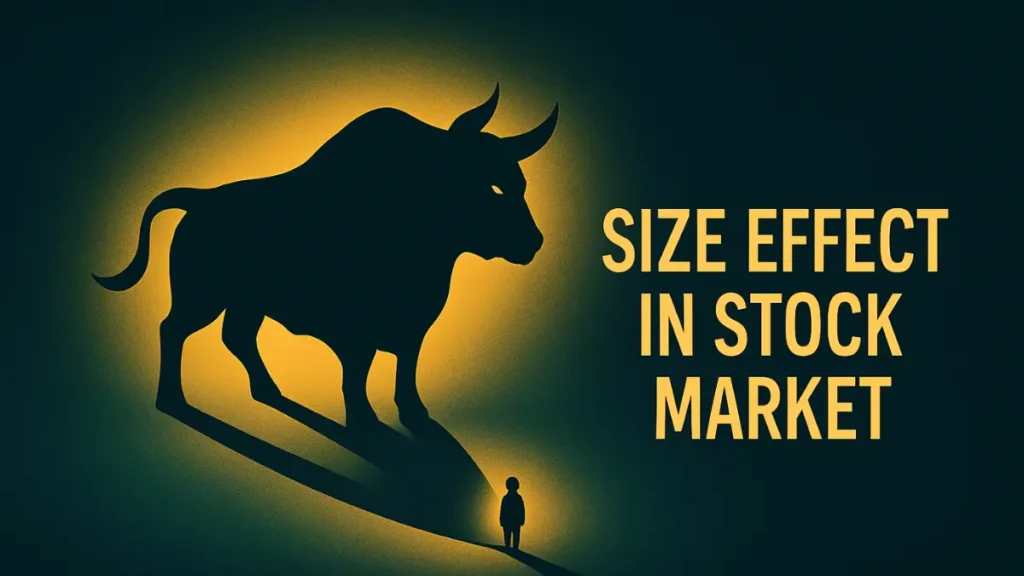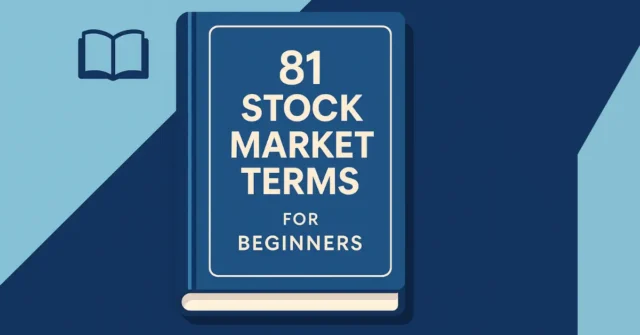Follow Us
Size Effect in Stock Market: What Small Firms Reveal

The size effect in stock market means this: over the long term, small companies (called small-cap stocks) tend to give better returns than large companies (big-cap stocks).
Now, before you sprint off to buy every small-cap stock you can find, slow down.
Because while the size effect is real, most people chase it the wrong way and get burned.
Why Do Small Cap Stocks Outperform?
Here’s the deal: smaller companies have more room to grow. They’re scrappier, more flexible, and often overlooked by the big guys.
Think of it like this:
- A ₹100 crore company doubling revenue is way more doable than Reliance trying to do the same.
- Small-caps are usually ignored by large funds because they’re “too small” to move the needle.
- Fewer eyeballs = more mispricings = more opportunity – for you.
This is what Eugene Fama and Kenneth French found in their research. Since then, it’s been studied, debated, doubted, but never fully disproven.
If It Works… Why Isn’t Everyone Doing It?
Because small-cap investing is not for the faint-hearted.
- Prices swing like crazy.
- News coverage is minimal.
- Liquidity sucks – you can’t always get in or out easily.
- You have to do your own homework – no CNBC hot takes to rely on.
Most retail investors want returns without the rollercoaster.
They jump in when a small-cap runs 50%, then panic-sell when it drops 20%. Rinse. Repeat. Regret.
The size effect rewards patience. Not hype-chasers.
Related Post:
Buy and Hold Strategy: The Secret to Long-Term Wealth
Real-World Example: When Small-Caps Shine
Between 2000 and 2010, small-cap stocks in the U.S. outperformed large-caps by a mile.
Why? After the dot-com bust, money rotated out of flashy tech giants and into smaller, real-world businesses with actual profits.
But here’s the kicker: from 2011 to 2020, large-caps crushed it again. So what gives?
The size effect shows up in cycles. Not every year. Not every quarter. But when it shows up, it punches hard.
This is why you need to zoom out. Think in terms of decades, not days.
Aren’t Small-Caps Just Riskier Junk?
Sure, some of them are garbage. But that’s not the point.
The size effect isn’t about buying random penny stocks and hoping for the best. That’s gambling.
The real play is this:
- Focus on small, profitable companies.
- Look for high return on equity, low debt, and skin in the game (owners who actually own shares).
- Avoid the hype stocks everyone’s talking about on Telegram groups.
Boring is beautiful in small-cap land.
The winners? They’re often small industrials, regional banks, niche software players – businesses that don’t trend on Twitter but quietly print money.
Why Most People Never Benefit from the Size Effect
Let’s be honest: most investors don’t have the mindset to win here.
They:
- Want results in weeks.
- Follow the herd.
- Fear short-term drops more than long-term missed gains.
They say they want alpha, but behave like traders.
If you want the size effect to work for you:
- Do your own research.
- Stay invested through ups & downs.
- Ignore the noise.
- Think like an owner – not a speculator.
This is not for people who check their portfolio 10 times a day.
Related Post:
How to Create a Stock Watchlist & Pick Winning Stocks Daily
So… Is the Size Effect Dead?
No. Not even close.
But here’s the truth: it’s asleep right now – or at least, quiet.
And that’s exactly when smart investors pay attention.
Because when the cycle turns and it will, the people who were quietly buying great small-caps while everyone else chased AI stocks or meme coins?
They’re going to eat.
Final Thought: Will You Be Ready?
The size effect is one of the last real edges left in the public markets, but only if you treat it with the respect it deserves.
It won’t work for gamblers. Or trend-chasers. Or people who quit halfway.
But if you’ve got the stomach, the patience, and the discipline to think long-term?
This could be your edge.
Don’t just look for hot stocks. Look for real, undervalued businesses. Hold them. Watch them grow.
That’s the size effect in action and it’s still one hell of a play.
Disclaimer:
This content is for informational purposes only and should not be considered financial advice.
Read full Disclaimer.




